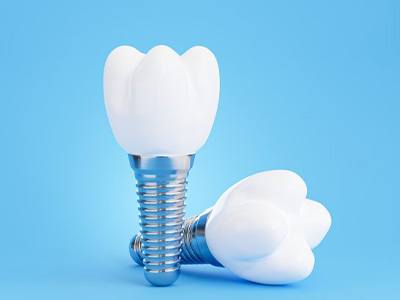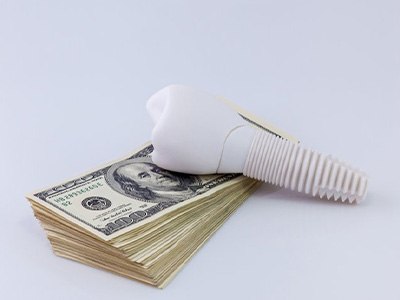Dental Implants — Hartford, CT · Avon, CT
Filling in the Gaps for Good
An incomplete smile no longer has to be the reality. Instead, you can embrace and enjoy what life has to offer thanks to customized prosthetics like dental implants. At Blue Back Dental, we are pleased to have a certified periodontist on staff. Their skill and expertise allow the entire dental implant process to be completed in-house so that you don’t need a referral. Whether you’re seeking traditional dental implants or All-On-4, we’ve got you covered. Call us today to schedule a consultation for dental implants in West Hartford and Avon.
Why Choose Blue Back Dental for Dental Implants?
-
Periodontist Provides
In-House Dental Implant Placement - State-of-the-Art Dental Technology for Accurate Treatment Planning
-
Trusted By the Community
for 20+ Years
What Are Dental Implants?

Dental implants are permanent prosthetics that serve as the foundation for sturdy, long-lasting teeth. As titanium posts that sit within the jawbone, they are the only tooth replacement solution capable of restoring the full root-to-crown structure, offering superior benefits when it comes to functionality, aesthetics, and comfort. Designed to mimic the natural tooth root, they provide continuous stimulation to the jawbone so that it does not deteriorate over time or change your facial shape – both of which can occur after getting traditional bridges or dentures.
The 4-Step Dental Implant Process

- Initial Dental Implant Consultation: You will meet with one of our dentists to discuss your oral and overall health. Based on our findings, we will determine if you need preliminary treatments before undergoing dental implant surgery.
- Dental Implant Surgery: For your surgery, we will administer local anesthesia to keep you comfortable and free of any pain. We’ll then use special instruments to make small incisions in your gums to place each dental implant before closing the tissue.
- Dental Implant Osseointegration/Abutment: Once the procedure is finished, you’ll return home to recover. It will take 3-6 months for osseointegration, the fusing of the bone and implant, to complete before you can return to have your metal abutments put into place.
- Delivery of Dental Implant Restoration(s): The last step is receiving your customized dental crown, bridge, or denture. Depending on how many teeth you are having replaced, we will secure the appropriate restoration to complete your refreshed, fully functional smile.
Benefits of Dental Implants

When compared to other tooth replacement options, the support, stability, functionality, longevity, aesthetics, and confidence that dental implants provide are far beyond other options. From the foods you can eat freely to the money you will save forgoing denture adhesives, frequent adjustments, and necessary replacements, it’s easy to see why millions of Americans have already chosen dental implants to restore their smiles.
Who Dental Implants Can Help

Most individuals who suffer from tooth loss are considered possible candidates for dental implants. Even if your mouth is not ready for them during your consultation, we can recommend various procedures (i.e., bone grafting, gum disease treatment) that will put you one step closer to dental implants in the future. We’ll also discuss the versatility of this type of treatment and how it can address any number of missing teeth.
Missing One Tooth

Only one dental implant post, abutment, and dental crown are needed to restore a single missing tooth. Eating, speaking, and smiling will no longer be a problem, and you’ll regain your confidence so that you are free to enjoy the foods you love and be around others with greater ease.
Missing Multiple Teeth

Two dental implant posts can be placed into either end of a large gap, and a customized bridge will be secured to the top of them to fill it in. Instead of altering healthy nearby teeth as we would with a fixed bridge, this solution makes it possible to better preserve your remaining enamel and bone.
Missing All of Your Teeth

An implant overdenture typically requires about four dental implant posts to support the new row of teeth. This is snapped in during the day and removed at night. We can fabricate these to rebuild your smile, but we can also suggest a hybrid prosthesis, also known as All-On-4 or All-On-6, which uses the dental implants as anchors for a more natural feeling teeth replacement that is screwed in permanently.
Understanding the Cost of Dental Implants

The cost of dental implants is different for everyone. Once we can review your smile and determine the severity of your tooth loss, we will be able to draw up a cost estimate that will outline how much you can expect to spend. That said, we know you might be wanting to get a sense of what all is involved in calculating your treatment bill. Click on the button below, and you’ll find more information about exactly that! Remember that you’re always welcome to call with any questions or concerns and enjoy the read through.
Preliminary Treatments & Dental Implant Surgery

Some patients require additional treatments in order to sufficiently support healthy implants. Gum disease, for example, can make it extremely difficult for an implant to stay in place, so it’s best to receive gum disease therapy before proceeding with your restorative treatment. Services like these add an additional cost to your overall bill, but are more likely to be at least partially covered by dental insurance.
The dental implant surgery itself will also be a separate cost from preliminary treatments and implant materials. That’s part of why we’re proud to be able to complete the entire process in-house – you won’t have to worry about receiving separate bills from different offices or needing to drive to a different practice.
The Parts of Your Dental Implant

Several factors can affect the price of each individual dental implant. For example:
- Depending on your needs, you may only need one dental implant to be placed – or several. More implants means more time and materials, and therefore more expenses.
- If your plan includes an appliance like an implant denture or a more complex restoration like a dental bridge, you’ll spend more than if you were only receiving an implant crown.
- The physical materials your implant is made from will also impact the total cost.
- Dental implant prices can even vary from manufacturer to manufacturer. Don’t be afraid to ask us about where we source our implants!
How Dental Implants Can Save You Money

In terms of upfront costs, dental implants are one of the more expensive restorative options in modern dentistry. However, their unique benefits – complete root-to-crown replacement, superior oral support, greater power for better diets, and increased durability – can save you money in the long run. You’ll require far fewer repairs and replacements, for instance, and likely won’t be needing as many treatments to provide additional oral support due to receding jawbone mass.
Does My Dental Insurance Cover Dental Implants?

While it is true that many dental insurance companies do not provide coverage for the surgery, they may cover other aspects of treatment such as your consultation, restoration, and preliminary procedures. Rest assured, our team will work with you to maximize your benefits and help you save on any out-of-pocket expenses!
Making Dental Implants Affordable

For those without dental insurance, we have other ways of making dental implant costs more affordable.
Through our membership plans, enrolled patients can enjoy reduced or completely covered costs for our services – all for one flat, yearly fee and no deductibles, yearly maximums, or waiting periods. We have plans geared towards adults, children, and patients experiencing gum disease, so be sure to check out our options!
If you’d prefer to pay at your own pace, CareCredit financing can help you do so. They offer several payment plans at little-to-no interest, which will essentially allow you to break down your total bill into smaller monthly installments. Let us know if you need assistance applying, and we’ll happily help you with the process!
Maintaining & Caring for Your Dental Implants

Unsure what habits you should adopt (and break) to keep your dental implants in tip-top shape? Good news: this section is for you! Below, you will find helpful information on how to maintain and care for yours so that they have the highest chances of lasting for multiple decades.
Make Oral Hygiene a Priority

Although dental implants are entirely artificial, it’s still important that you commit to good oral hygiene habits. After all, your gums can easily get infected if you stop caring for them, and any natural teeth you have can get damaged along the way too. So, it’s of the utmost importance that you brush, floss, and rinse with mouthwash consistently. It’s also important that you incorporate other good habits into your routine, like changing your toothbrush head (or getting a new toothbrush) every quarter.
Eat a Healthy Diet

Eating vitamin-rich, nutrient-dense foods doesn’t just benefit your overall health; it benefits your oral health too. That’s why we encourage our patients to eat lots of seasonal fruits and vegetables (as well as lean proteins, healthy fats, and filling carbs). We also recommend exercising caution with extremely crunchy snacks, like hard pretzels and raw almonds, since they increase the chances of your restoration breaking.
Break Bad Habits

As we mentioned above, it’s not just about committing to good habits; it’s also about breaking any existing bad ones. A few examples include biting your nails, chewing on ice cubes, and using your teeth as tools to open things. Understandably, quitting is sometimes easier said than done. If you need any recommendations on how to break bad habits like these, don’t hesitate to let us know! We’d be happy to share what has worked for our patients in the past.
Protect Your Dental Implants

Exercising caution with crunchy snacks and not using your teeth as tools to open things will dramatically decrease the chances of something bad happening, like your restoration cracking. To prevent damage from unforeseen impact, like a bad fall, we encourage our patients to wear a mouthguard during sports as well (including non-contact ones, like running).
Schedule Regular Dental Checkups

Whether you’re missing one tooth or all of your teeth, you need to come to our West Hartford dental office every six months for a checkup and cleaning. In addition to screening for oral cancer and removing built-up plaque, we use these appointments to examine the condition of your dental implant. We also examine your gums surrounding it and any natural teeth you have to ensure they are healthy.
If you have any questions for us about maintaining your smile, don’t hesitate to get in touch – whether you’re about to schedule your first appointment or you’ve been enjoying your dental implants for several years now. We’re always here to help our patients!
Dental Implant FAQs

Dental implants are the most reliable method of treating tooth loss, however, they can be a big investment. Don't worry if you have a few concerns. Your dentist will explain everything during your consultation and address any questions. You can also contact our office to speak with a member of our team or take a look at the most frequently asked questions below.
Can I Take Dental Implants Out?
Only a trained professional can remove a dental implant because it replaces both the tooth root and the crown. A titanium implant post is surgically placed into your jawbone to serve as a new root. Your jaw will fuse to it through a process called osseointegration, providing a stable foundation for your restoration that's attached using an abutment. While you can't remove the post, some implant dentures can be taken out for easy cleaning.
How Long Do Dental Implants Last?
Dental implants have over a 95% success rate and are proven to last for 30 years or more. Many factors affect their lifespan, like the quality of the materials and the location of the implant. Back teeth experience more wear and tear than those in the front, so dental implants used for molars may have a slightly shorter life expectancy. You can get the most from your investment by practicing good oral hygiene and visiting your dentist regularly.
Does It Hurt to Get Dental Implants?
Although you'll require surgery to have your posts placed, you don't have to worry about any pain. Your implant dentist will use a local numbing agent and sedation to block any pain. You won't feel anything during your placement surgery, but your mouth will be tender for a few days after the effects of any numbing medications or sedatives wear off. You can manage it using an OTC pain reliever and following your dentist's aftercare instructions. Applying a cold compress can reduce pain, swelling, and bruising.
What Are the Signs of Dental Implant Failure?
The risk of dental implant failure is less than 5%, but it’s wise to be aware of the signs of a problem, like pain, redness, swelling, or bleeding near the implant. They can be symptoms of peri-implantitis, an infection that can cause your dental implants to fail. The sooner you receive treatment, the more likely your dentist can save your implant. Contact our office right away if your implant feels loose.
What Should I Do If My Implant Feels Loose?
Seek treatment immediately if your dental implant is wiggling. While it could be as simple as a damaged restoration, it can also be a sign of dental implant failure.

